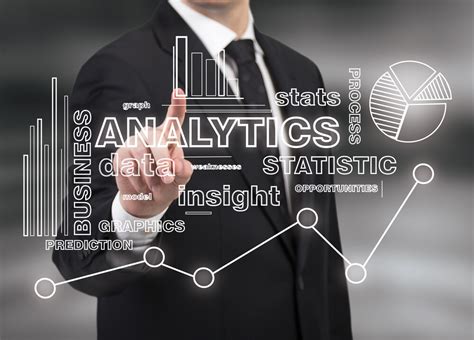The Importance of Business Analytics in Decision Making

Learn how to utilize business analytics, make data-driven decisions, and implement predictive analytics for improved performance using business intelligence tools. Boost your business strategy now!In today’s rapidly evolving business landscape, data has become an invaluable asset for organizations looking to gain a competitive edge. The utilization of business analytics has become increasingly important for making informed and effective decisions. In this blog post, we will explore the significance of business analytics in decision making, and how it can impact overall business performance. We will delve into the basics of business analytics, the process of data-driven decision making, the impact of business analytics on performance, the utilization of predictive analytics, and the implementation of business intelligence tools. By understanding the role of business analytics in today’s business environment, companies can harness the power of data to drive strategic decisions and ultimately achieve their business goals. Whether you are a seasoned business professional or a budding entrepreneur, the insights in this post will provide you with a deeper understanding of the importance of integrating business analytics into your decision-making processes.
Understanding Business Analytics
Business analytics is the process of analyzing data and using it to make informed decisions in a business setting. It involves the use of statistical analysis, predictive modeling, and data visualization to identify trends and patterns that can help organizations improve their operations and performance.
Understanding business analytics is essential for modern organizations as it allows them to gain valuable insights into their operations and make data-driven decisions. By analyzing data from various sources, including sales, customer feedback, and market trends, organizations can identify opportunities for improvement and develop strategies to achieve their goals.
With the rapid growth of digital technologies and the increasing amount of data available to organizations, business analytics has become an integral part of decision-making processes. From identifying potential market opportunities to predicting customer behavior, the insights derived from business analytics can provide organizations with a competitive advantage in today’s fast-paced business environment.
Data-driven Decision Making Process
When it comes to making important decisions for a business, data-driven approaches can make all the difference. By utilizing business analytics to gather and analyze relevant data, companies can make more informed and rational decisions that are based on facts rather than gut feelings. This process involves collecting data from various sources, such as customer feedback, market trends, and financial performance, and using analytics tools to extract valuable insights.
Once the data has been analyzed, the next step in the data-driven decision-making process is to interpret the findings and identify key patterns or trends. This enables business leaders to gain a deeper understanding of their operations and make predictions about future outcomes. By leveraging the power of predictive analytics, companies can anticipate potential challenges and opportunities, allowing them to proactively plan and strategize for the future.
Ultimately, the use of business intelligence tools is essential for implementing a successful data-driven decision-making process. These tools enable businesses to visualize data in meaningful ways and communicate insights across the organization. This not only fosters a culture of fact-based decision-making, but also ensures that all stakeholders are aligned and informed when it comes to strategic choices and actions.
Impact of Business Analytics on Performance
Impact of Business Analytics on Performance
In today’s fast-paced business world, the use of business analytics has become a crucial component in improving overall performance. Companies are relying on data-driven insights to make strategic decisions that can ultimately impact the success and growth of the organization.
By harnessing the power of data-driven decision making processes, businesses can identify trends, patterns, and opportunities that may have otherwise gone unnoticed. This allows for a proactive approach to problem-solving and the ability to capitalize on potential opportunities before they pass by.
Furthermore, the implementation of predictive analytics has revolutionized the way businesses operate. With the ability to forecast future trends and outcomes, organizations can better plan and prepare for potential challenges, as well as optimize their resources for maximum efficiency and productivity.
Utilizing Predictive Analytics
The Importance of Business Analytics in Decision Making
Predictive analytics is a powerful tool that can be used to forecast future events and trends based on historical data. By analyzing patterns and correlations in data, businesses can gain insights into potential outcomes and make more informed decisions. Utilizing predictive analytics can help organizations identify opportunities for growth, anticipate market trends, and mitigate risks. With the ability to predict future outcomes, businesses can develop more effective strategies and allocate resources more efficiently.
One of the key benefits of predictive analytics is its ability to improve business performance. By identifying patterns and trends in data, organizations can gain a better understanding of customer behavior, market dynamics, and operational efficiency. This can lead to more targeted marketing campaigns, improved customer satisfaction, and optimized business operations. With the ability to anticipate changes in market conditions, businesses can adapt more quickly and stay ahead of the competition.
Another important aspect of predictive analytics is risk management. By analyzing historical data and identifying potential risks, businesses can take proactive measures to mitigate potential threats. This can include predicting equipment failures, identifying fraudulent activities, and forecasting market fluctuations. By using predictive analytics to anticipate risks, organizations can develop contingency plans and implement risk mitigation strategies, ultimately minimizing potential losses and maximizing opportunities for success.
Implementing Business Intelligence Tools
Implementing business intelligence tools is crucial for organizations to stay competitive in today’s data-driven world. These tools allow companies to gather, store, analyze, and visualize vast amounts of data to gain valuable insights into their business operations. With the right business intelligence tools in place, organizations can make more informed decisions, identify new opportunities, and optimize their overall performance.
One of the key benefits of implementing business intelligence tools is the ability to access real-time data. This means that organizations can make decisions based on the most up-to-date information available, rather than relying on outdated or inaccurate data. With real-time insights, companies can react quickly to changes in the market, customer preferences, or internal operations, giving them a competitive edge.
Furthermore, business intelligence tools enable organizations to create interactive dashboards and reports that provide a clear and comprehensive view of their data. This allows decision-makers at all levels of the organization to easily access and interpret the information they need to make timely, strategic decisions. By democratizing data access, business intelligence tools empower employees to contribute to the decision-making process and drive business growth.





